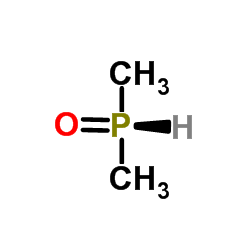7211-39-4
| 中文名 | 二甲基氧化膦 |
|---|---|
| 英文名 | dimethyl(oxo)phosphanium |
| 英文别名 |
dimethyl-oxo-phosphanium
EINECS 230-591-2 Dimethylphosphine oxide Phosphine oxide,dimethyl Phosphorane, dimethyl-, oxide Dimethylphosphanoxid |
| 沸点 | 84.5±23.0 °C at 760 mmHg |
|---|---|
| 分子式 | C2H7OP |
| 分子量 | 78.050 |
| 闪点 | 4.9±22.6 °C |
| 精确质量 | 78.023453 |
| PSA | 40.54000 |
| LogP | -2.21 |
| 外观性状 | liquid | white solid to light yellow |
| 蒸汽压 | 80.6±0.1 mmHg at 25°C |
| 储存条件 | 室温,干燥 |
|
Section 1: Product Identification Chemical Name:Dimethylphosphine oxide, min. 97% CAS Registry Number:7211-39-4 Formula:(CH3)2P(O)H EINECS Number:none Chemical Family:organophosphorus compound Synonym:Dimethylphosphorus oxide
Section 2: Composition and Information on Ingredients IngredientCAS NumberPercentACGIH (TWA)OSHA (PEL) Title compound7211-39-4100%no datano data Section 3: Hazards Identification Emergency Overview:Irritating to skin, eyes and respiratory tract. May be harmful if swallowed. Primary Routes of Exposure:Inhalation, skin, eyes. Eye Contact:Causes moderate irritation of the eyes. Skin Contact:Causes irritation of the skin. May cause redness, itching and pain. Inhalation:Irritating to the nose, mucous membranes and respiratory tract. Ingestion:No specific information is available on the physiological effects of ingestion. May be harmful if swallowed. Acute Health Affects:Irritating to skin, eyes and respiratory tract. Chronic Health Affects:No information on long-term chronic effects. NTP:No IARC:No OSHA:No SECTION 4: First Aid Measures Immediately flush the eyes with copious amounts of water for at least 10-15 minutes. A victim may need Eye Exposure: assistance in keeping their eye lids open. Get immediate medical attention. Wash the affected area with water. Remove contaminated clothes if necessary. Seek medical assistance if Skin Exposure: irritation persists. Remove the victim to fresh air. Closely monitor the victim for signs of respiratory problems, such as difficulty Inhalation: in breathing, coughing, wheezing, or pain. In such cases seek immediate medical assistance. Seek medical attention immediately. Keep the victim calm. Give the victim water (only if conscious). Induce Ingestion: vomiting only if directed by medical personnel. SECTION 5: Fire Fighting Measures Flash Point:no data Autoignition Temperature:no data Explosion Limits:no data Extinguishing Medium:carbon dioxide, dry powder or foam. Fire fighters should be equipped with a NIOSH approved positive pressure self-contained breathing apparatus Special Fire Fighting Procedures: and full protective clothing. Hazardous Combustion andIf involved in a fire this material may emit toxic organic fumes. Decomposion Products: Unusual Fire or Explosion Hazards: Contact of dimethylphosphine oxide with carbon tetrachloride leads to explosive decomposition. SECTION 6: Accidental Release Measures Small spills can be mixed with vermiculite, sodium carbonate or other suitable non combustible adsorbent and Spill and Leak Procedures: swept up. SECTION 7: Handling and Storage Handling and Storage:Keep container tightly closed. Store in a cool, dry place. SECTION 8: Exposure Controls and Personal Protection Eye Protection:Always wear approved safety glasses when handling a chemical substance in the laboratory. Skin Protection:Wear protective clothing and gloves. Ventilation:Handle the material in an efficient fume hood. If ventilation is not available a respirator should be worn. The use of respirators requires a Respirator Respirator: Protection Program to be in compliance with 29 CFR 1910.134. Ventilation:Handle the material in an efficient fume hood. Additional Protection:No additional protection required. SECTION 9: Physical and Chemical Properties Color and Form:white solid Molecular Weight:78.05 Melting Point:no data Boiling Point:no data Vapor Pressure:no data Specific Gravity:no data Odor:musty odor Solubility in Water:slightly soluble SECTION 10: Stability and Reactivity Stability:air and moisture stable Hazardous Polymerization:no hazardous polymerization Conditions to Avoid:contact with carbon tetrachloride leads to explosive decomposition. Incompatibility:oxidizing agents, active metals, carbon tetrachloride and halogens. Decomposition Products:carbon dioxide, carbon monoxide, organic fumes and phosphorus oxides. SECTION 11: Toxicological Information RTECS Data:No information available in the RTECS files. Carcinogenic Effects:no data Mutagenic Effects:no data Tetratogenic Effects:no data SECTION 12: Ecological Information Ecological Information:No information available SECTION 13: Disposal Considerations Disposal:Dispose of according to federal, state, and local regulations. SECTION 14: Transportation Shipping Name (CFR):Non-hazardous Hazard Class (CFR):NA Additional Hazard Class (CFR):NA Packaging Group (CFR):NA UN ID Number (CFR):NA Shipping Name (IATA):Non-hazardous Hazard Class (IATA):NA Additional Hazard Class (IATA):NA Packaging Group (IATA):NA UN ID Number (IATA):NA SECTION 15: Regulatory Information TSCA:Not listed in the TSCA inventory. SARA (Title 313):Title compound not listed. Second Ingredient:none SECTION 16 - ADDITIONAL INFORMATION N/A |


